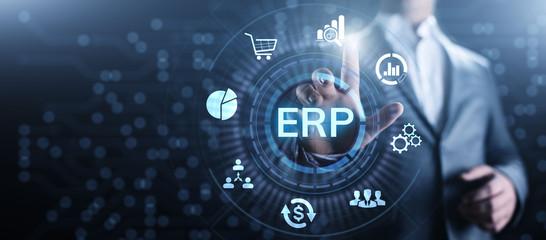Lately, sustainability has arisen as a crucial worry for organizations across all areas. The push towards naturally and socially capable practices has driven associations to look for arrangements that can coordinate sustainability into their activities. Enterprise Asset Arranging (ERP) frameworks, customarily intended to smooth out business processes and further develop proficiency, are presently being utilized to help sustainability objectives. This paper investigates how ERP frameworks can improve sustainability efforts, the advantages they offer, and the difficulties organizations might look in coordinating these frameworks with their sustainability targets.
By recognizing shortcomings and proposing upgraded rehearses, business consultants can fundamentally improve an organization's benefit.
Grasping ERP Frameworks
Enterprise Asset Arranging (ERP) frameworks are coordinated programming platforms utilized by associations to oversee and robotize different business processes. These frameworks incorporate a scope of functionalities, including monetary administration, store network the executives, HR, and client relationship the board. By uniting information and cycles into a solitary bound together framework, ERP arrangements empower associations to further develop productivity, lessen functional expenses, and gain ongoing experiences into their tasks.
The Connection Among ERP and Sustainability
Sustainability in business alludes to rehearses that address present issues without compromising the capacity of people in the future to address their own issues. This incorporates ecological stewardship, social obligation, and financial performance. ERP frameworks can assume a huge part in propelling sustainability by giving devices and functionalities that help these regions.
. Social Responsibility:
Social sustainability includes guaranteeing fair work works on, supporting local area improvement, and advancing moral way of behaving. ERP frameworks can upgrade social obligation by giving elements that help moral obtaining and work the board. For example, ERP arrangements can assist organizations with guaranteeing that their providers stick to fair work rehearses and conform to basic liberties principles. By incorporating social obligation measurements into their ERP frameworks, associations can track and investigate their social effect and guarantee arrangement with their corporate social obligation (CSR) objectives.
. Enhanced Revealing and Compliance:
Sustainability announcing and consistence with ecological guidelines are basic for organizations endeavoring to meet their sustainability targets. ERP frameworks work with this via robotizing detailing cycles and it is precise and reliable to guarantee that information. This diminishes the gamble of mistakes and works on the most common way of creating reports for administrative consistence and partner correspondence.
Increased Transparency:
Straightforwardness is a critical part of sustainability, and ERP frameworks upgrade straightforwardness by giving a reasonable perspective on business tasks. This straightforwardness reaches out to store network the board, where ERP frameworks can follow the provenance of materials and guarantee that providers meet sustainability standards. This degree of perceivability assists associations with building entrust with partners and shows their obligation to supportable practices.
Attention: which accounting software is used in pakistan? These are famous bookkeeping programming utilized in Pakistan incorporates QuickBooks, Sage, and Count, generally embraced for their convenience and extensive monetary administration highlights.
Data Reconciliation and Quality:
Coordinating sustainability information into ERP frameworks requires exact and dependable information sources. Guaranteeing information quality and consistency across different divisions and frameworks can be a test. Unfortunate information quality can sabotage the adequacy of ERP frameworks and upset the association's capacity to precisely track and report on sustainability measurements.
Change Management:
Effectively coordinating sustainability into ERP frameworks requires compelling change the executives methodologies. Representatives might have to adjust to new cycles and apparatuses, and there might be protection from change. Associations should put resources into preparing and support to guarantee a smooth change and boost the advantages of their ERP frameworks.
Evolving Norms and Regulations:
Sustainability norms and guidelines are ceaselessly advancing, and ERP frameworks should be versatile to these changes. Staying aware of new guidelines and integrating them into the ERP framework can be testing and requires progressing updates and changes.
Scalability and Flexibility:
As associations develop and their sustainability objectives advance, their ERP frameworks should be adaptable and adaptable. Guaranteeing that the ERP framework can oblige changes in business cycles and sustainability goals is fundamental for long haul achievement. Organizations should cautiously assess their ERP answers for guarantee they can adjust to future requirements.
Future Patterns and Valuable open doors
As innovation keeps on progressing, ERP frameworks will assume an undeniably significant part in supporting sustainability efforts. The combination of man-made brainpower (computer based intelligence), AI, and blockchain innovation into ERP frameworks holds critical potential for upgrading sustainability rehearses. Artificial intelligence and AI can give more exact forecasts and experiences into sustainability measurements, while blockchain innovation can further develop store network straightforwardness and recognizability.
End
ERP frameworks have developed past their conventional job of smoothing out business cycles to turn out to be useful assets for supporting sustainability efforts. By coordinating sustainability measurements and functionalities into ERP frameworks, associations can upgrade their ecological stewardship, social obligation, and financial performance. Regardless of the difficulties related with coordinating ERP frameworks with sustainability objectives, the advantages of further developed information the board, revealing, functional productivity, direction, and straightforwardness make it a significant speculation. As innovation keeps on progressing, ERP frameworks will assume an undeniably pivotal part in assisting organizations with accomplishing their sustainability targets and add to a more economical future.
